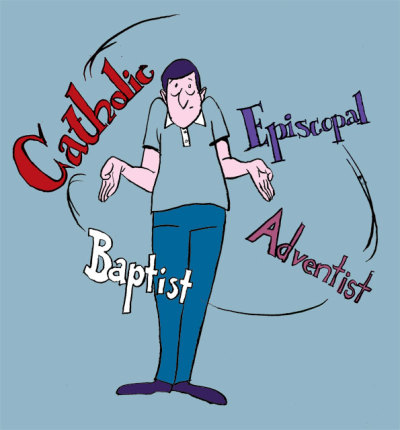Women pastors, spiritual gift of tongues: Absolutists and the sin of misrepresentation

In 2004, Dr. Rich Mouw, then-president of Fuller Seminary, spoke in front of a large assembly of evangelicals and Latter-day Saints (Mormons). In part, he apologized for what he saw as a misrepresentation of the LDS faith on the part of evangelicals. He would know, considering he spent the preceding half-dozen years (and the following decade) interacting with Latter-day Saints, asking and answering questions with his LDS counterparts. Make no mistake, Mouw was and is Christian, an expert on Calvinist theology who rejects the doctrines that make Mormonism distinct. He simply recognized something that perhaps we all need a reminder of, considering an upcoming presidential election as well as, more immediately, the imminent Southern Baptist Convention annual meeting. Namely, that we cannot bear false witness against our neighbors, no matter how much we disagree with them.
In June, the SBC is preparing to discuss — and in all probability, adopt — what is termed “the Law Amendment.” This amendment would add a clause to the SBC’s constitution, stating that only men are permitted to be appointed as elders and pastors, a position called “complementarianism.” While much of the SBC appears to be in support of the amendment, it has nonetheless stirred significant conversation about the role of women in ministry. And in those discussions, I have watched as many on both sides of the issue have sinned against brothers and sisters in Christ in an effort to discredit dissenting positions.
A big concern of many in the SBC is the idea of liberal drift — that if they allow women to be pastors and elders now, tomorrow they’ll be condoning same-sex relationships. “Look at the United Methodists,” I’ve heard. “They had female pastors and look where that’s gotten them.” Yet, the denomination that I have called home for the last four years — the Assemblies of God (AG) has ordained women since its inception in 1914. This stance is considered “egalitarianism.” Contrary to the claims of some, the AG is far from condoning same-sex relationships. The same goes for Foursquare, Christian and Missionary Alliance, and the Free Methodist Church, among others. Just two years ago, the Global Methodist Church was birthed, splitting off from the United Methodists in another example of egalitarian denominations demonstrating their commitment to a historic Christian sexual ethic.
Contrary to what has been claimed by many complementarians, it is possible to be egalitarian and not affirm same-sex relationships. These denominations prove it.
Another argument I frequently hear is, “you don’t care what the Bible teaches.” I can’t speak for others, but if I did not care what the Bible taught, I wouldn’t have felt a deep pain for the last three years as the denomination I call home tells me that because I have not spoken in tongues, I cannot become a credentialed minister. If the Bible was simply an accessory to me, I would’ve lied, claiming I spoke in tongues in private. Instead, I have chosen to wrestle with the incredible hurt of hearing my community reject my call to vocational ministry in this denomination. Why? Because I submit to Scripture — and Scripture commands me to be honest.
While I do not find the AG’s argument on the issue persuasive, I have never accused the denomination or those within it of not caring what Scripture says. I am confident that those who stand behind that doctrine do so in an earnest desire to follow what they believe the Bible teaches. Likewise, the egalitarian interpretation of Scripture has rational, thought-out reasonings for its position. Whether or not you find them convincing is a different story.
I am not saying you must agree with me on this topic. I am saying that it is not worth the cost of sin to misrepresent someone’s beliefs to “win.” Mouw was right when he said evangelicals have sinned against Mormons. It’d also be correct to say complementarians have sinned against egalitarians by saying we don’t care about Scripture. Moreover, it’d be correct to say some egalitarians have sinned against complementarians by saying all complementarians are simply misogynistic and want to oppress women, despite many complementarians having reasonable scriptural support. I can disagree with you while still honoring your reasonable intellectual convictions.
I’m also not saying we shouldn’t contend for truth, as Jude tells us. It is good and necessary to seek truth. Paul affirms this in Galatians 1:6-9, among other places. But we must be truthful ourselves. In his book, Talking to Mormons, Mouw says: “If in our attempts to defeat [others] we play fast and loose with the truth, by attributing things to them they in fact don’t teach, and if we don’t really care whether we have it right or not, then we have become false teachers: teachers of untruth!” May I remind you that he is speaking to a group that disagrees with him much more than we do. No matter the level of disagreement, misrepresentation is sin.
I often lament the fact that I was born too late to be an early 2000s music snob. I love listening to music that nobody else knows. One song that falls into that category is “You Are My Country” by Gable Price and Friends. The song opens and repeats a line that has gripped me from the first time I heard it: “Maybe we will get to Heaven and realize we were both wrong.” What if that is true? What if God is neither complementarian or egalitarian, Calvinist or Arminian, Democrat or Republican?
On that day, when we must give an account of ourselves to God (Romans 14:12), if it is true and we are wrong, we should pray that the only error God can find in us is our doctrine itself, and not in the way we treated each other as we contended for truth.
Kyle Perry is a youth pastor and teacher residing in Washington State. In Fall 2024, Kyle will begin pursuing a Master of Divinity at Baylor's Truett Seminary. Among Kyle's primary interests is engaging in interfaith dialogue with Latter-day Saints (Mormons) from a traditional Evangelical perspective.



























